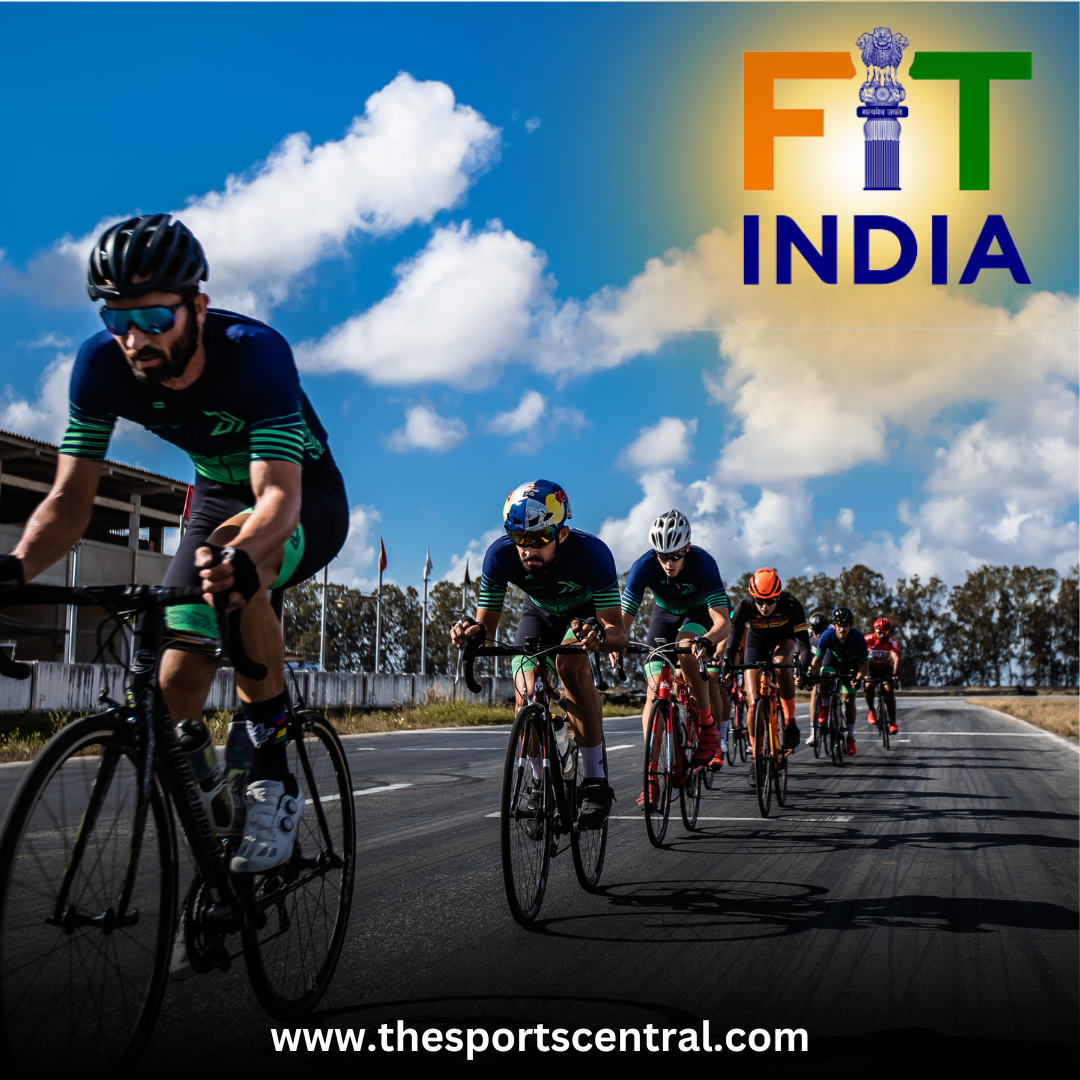Union Minister of Youth Affairs and Sports, Mansukh Mandaviya, on Tuesday flagged off the Fit India Cycling Movement at the Major Dhyan Chand National Stadium in Delhi. The event marked the beginning of a nationwide effort to promote fitness, environmental awareness, and community engagement through cycling.
The initiative is a continuation of the Fit India Movement, launched by Prime Minister Narendra Modi in 2019, with a vision of encouraging citizens to prioritize their health and fitness. The cycling event underscores the movement’s broader goals of building a healthier India, addressing pollution, and fostering a collective commitment to fitness.
The Inaugural Event in Delhi
The launch event in the national capital witnessed the participation of elite athletes, fitness influencers, and political leaders, including BJP Lok Sabha MP Tejasvi Surya. Union Minister Mansukh Mandaviya, who actively participated in the cycling ride from Major Dhyan Chand National Stadium to Raisina Hills and back, emphasized the importance of integrating fitness into daily life.
Addressing the gathering, Mr. Mandaviya highlighted the key objectives of the initiative. He stated, “Modi Ji has started the Fit India Movement. The people of the country should remain fit and build a developed nation. With this aim, we have decided to go cycling for one hour each week. Today, marking the beginning, the cycling event is being held at 1,000 places across the country.”
Mandaviya further encouraged citizens to adopt cycling as a lifestyle choice, not only to stay healthy but also to address the growing issue of pollution in urban areas. “We should make this a part of our life, do cycling, stay healthy, and find the solution to pollution through cycling,” he remarked.
Key Objectives of the Fit India Cycling Movement
The Fit India Cycling Movement aligns with multiple objectives that cater to the health, environment, and fitness needs of the country.
- Promoting Health and Fitness
The primary goal of the movement is to encourage citizens to incorporate physical activity into their daily routines. Cycling, as a form of exercise, is known to improve cardiovascular health, strengthen muscles, and enhance overall fitness. By promoting cycling for at least one hour a week, the initiative aims to instill a habit of regular physical activity among individuals of all age groups. - Addressing Environmental Concerns
With increasing urbanization and vehicular emissions, pollution has become a major challenge, particularly in cities like Delhi, where the Air Quality Index (AQI) frequently reaches hazardous levels. The cycling movement aims to raise awareness about reducing dependence on motor vehicles, thereby contributing to cleaner air and a healthier environment. - Fostering Community Engagement
The movement also aims to bring communities together through collective activities like cycling events. By participating in group rides, citizens can develop a sense of unity, camaraderie, and shared responsibility for their health and environment. - Supporting Indigenous Sports
In line with the broader goals of the Fit India Movement, the initiative also seeks to promote indigenous games and traditional sports of India. These activities, rooted in cultural heritage, offer unique opportunities for individuals to stay fit while embracing their traditions.
Collaboration and Nationwide Reach
The cycling event has been conducted in direct collaboration with key organizations such as the Cycling Federation of India (CFI), MY Bharat, Sports Authority of India (SAI) regional centers, National Centres of Excellence (NCOEs), and Khelo India Centres (KICs). District administrations across the country have also played a crucial role in organizing and facilitating these events.
The collaboration ensures that the initiative reaches every corner of the nation, from urban hubs to rural regions. With cycling events taking place simultaneously at 1,000 locations, the movement has set a benchmark for large-scale fitness campaigns.
A Nationwide Push for Fitness
The Fit India Movement, launched by Prime Minister Narendra Modi in 2019, serves as the foundation for initiatives like the cycling event. The movement focuses on promoting overall health, encouraging sports participation, and reviving indigenous games. It aims to position India as a sports superpower while ensuring the well-being of its citizens.
The cycling movement represents a key milestone in achieving this vision. By promoting cycling as a sustainable and accessible form of exercise, it encourages citizens from all walks of life to prioritize their health and fitness.
Tejasvi Surya, the BJP MP who participated in the cycling event, highlighted the significance of fitness among the youth. Speaking to ANI, Surya said, “Today, taking forward the PM’s vision of Fit India, Sports Minister Mansukh Mandaviya has come up with a very interesting concept. I call upon all young people especially to take up some form of sports, some form of fitness activities which will give us a lot of mental clarity, will bring a lot of discipline in our lives, and teach us very important life lessons of consistency, perseverance, and discipline.”
His remarks emphasize the role of fitness in shaping not only physical health but also mental strength and character development.
Cycling: A Sustainable Solution for Health and Environment
Cycling is one of the most sustainable forms of transportation and exercise. It offers a range of benefits that address health, environmental, and economic challenges:
- Health Benefits
- Improves cardiovascular health and lung capacity
- Enhances muscle strength and joint mobility
- Reduces stress and boosts mental well-being
- Environmental Benefits
- Reduces carbon emissions and pollution caused by motor vehicles
- Promotes cleaner air and better AQI levels in cities
- Encourages sustainable urban mobility
- Economic Benefits
- Cost-effective mode of transportation
- Reduces fuel consumption and dependency on motor vehicles
- Lowers healthcare costs by promoting preventive health
By promoting cycling, the Fit India Cycling Movement effectively addresses these interconnected challenges, offering a holistic solution for a healthier and greener India.
The Road Ahead: Scaling the Movement
The success of the Fit India Cycling Movement lies in its scalability and long-term impact. Moving forward, the Ministry of Youth Affairs and Sports plans to conduct similar events regularly, encouraging citizens to make cycling a habit.
To maximize participation, educational institutions, workplaces, and local communities can play a significant role in promoting cycling. Schools and colleges can introduce cycling clubs, while workplaces can incentivize employees to adopt cycling for short commutes.
Additionally, local governments and urban planners can contribute by developing cycling infrastructure, including dedicated cycle lanes, parking facilities, and rental services. These efforts will further encourage citizens to embrace cycling as a primary mode of transportation.
Conclusion
The launch of the Fit India Cycling Movement marks a significant step towards promoting fitness, environmental sustainability, and community engagement. Flagged off by Union Minister Mansukh Mandaviya, the event sets the stage for a nationwide push to integrate cycling into daily life.
With support from organizations like the Cycling Federation of India and initiatives like Khelo India, the movement has the potential to transform India’s approach to health and fitness. By encouraging citizens to adopt cycling, the initiative not only addresses pressing environmental concerns but also fosters a culture of well-being and unity.
As Prime Minister Narendra Modi’s vision for a Fit India continues to gain momentum, initiatives like the cycling movement serve as powerful reminders that individual actions, when united, can create lasting impacts for a healthier and greener future.










